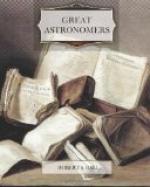A faithful chronicler has given us an interesting account of the way in which Isaac Herschel educated his sons; the narrative is taken from the recollections of one who, at the time we are speaking of, was an unnoticed little girl five or six years old. She writes:—
“My brothers were often introduced as solo performers and assistants in the orchestra at the Court, and I remember that I was frequently prevented from going to sleep by the lively criticisms on music on coming from a concert. Often I would keep myself awake that I might listen to their animating remarks, for it made me so happy to see them so happy. But generally their conversation would branch out on philosophical subjects, when my brother William and my father often argued with such warmth that my mother’s interference became necessary, when the names—Euler, Leibnitz, and Newton—sounded rather too loud for the repose of her little ones, who had to be at school by seven in the morning.” The child whose reminiscences are here given became afterwards the famous Caroline Herschel. The narrative of her life, by Mrs. John Herschel, is a most interesting book, not only for the account it contains of the remarkable woman herself, but also because it provides the best picture we have of the great astronomer to whom Caroline devoted her life.
This modest family circle was, in a measure, dispersed at the outbreak of the Seven Years’ War in 1756. The French proceeded to invade Hanover, which, it will be remembered, belonged at this time to the British dominions. Young William Herschel had already obtained the position of a regular performer in the regimental band of the Hanoverian Guards, and it was his fortune to obtain some experience of actual warfare in the disastrous battle of Hastenbeck. He was not wounded, but he had to spend the night after the battle in a ditch, and his meditations on the occasion convinced him that soldiering was not the profession exactly adapted to his tastes. We need not attempt to conceal the fact that he left his regiment by the very simple but somewhat risky process of desertion. He had, it would seem, to adopt disguises to effect his escape. At all events, by some means he succeeded in eluding detection and reached England in safety. It is interesting to have learned on good authority that many years after this offence was committed it was solemnly forgiven. When Herschel had become the famous astronomer, and as such visited King George at Windsor, the King at their first meeting handed to him his pardon for deserting from the army, written out in due form by his Majesty himself.




